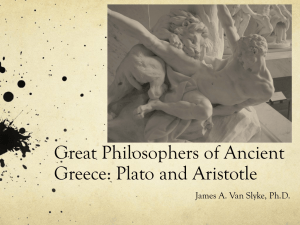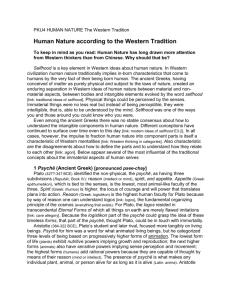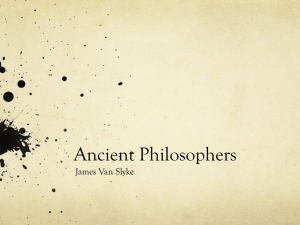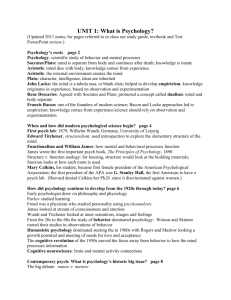Multiple Choice Questions
advertisement
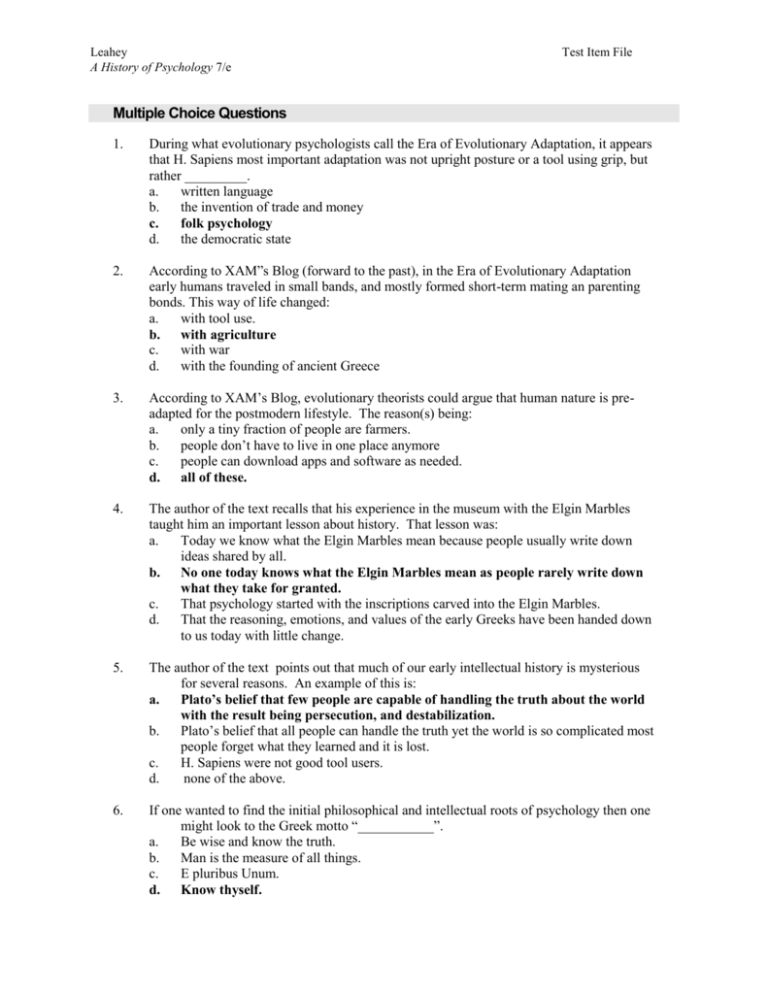
Leahey A History of Psychology 7/e Test Item File Multiple Choice Questions 1. During what evolutionary psychologists call the Era of Evolutionary Adaptation, it appears that H. Sapiens most important adaptation was not upright posture or a tool using grip, but rather _________. a. written language b. the invention of trade and money c. folk psychology d. the democratic state 2. According to XAM”s Blog (forward to the past), in the Era of Evolutionary Adaptation early humans traveled in small bands, and mostly formed short-term mating an parenting bonds. This way of life changed: a. with tool use. b. with agriculture c. with war d. with the founding of ancient Greece 3. According to XAM’s Blog, evolutionary theorists could argue that human nature is preadapted for the postmodern lifestyle. The reason(s) being: a. only a tiny fraction of people are farmers. b. people don’t have to live in one place anymore c. people can download apps and software as needed. d. all of these. 4. The author of the text recalls that his experience in the museum with the Elgin Marbles taught him an important lesson about history. That lesson was: a. Today we know what the Elgin Marbles mean because people usually write down ideas shared by all. b. No one today knows what the Elgin Marbles mean as people rarely write down what they take for granted. c. That psychology started with the inscriptions carved into the Elgin Marbles. d. That the reasoning, emotions, and values of the early Greeks have been handed down to us today with little change. 5. The author of the text points out that much of our early intellectual history is mysterious for several reasons. An example of this is: a. Plato’s belief that few people are capable of handling the truth about the world with the result being persecution, and destabilization. b. Plato’s belief that all people can handle the truth yet the world is so complicated most people forget what they learned and it is lost. c. H. Sapiens were not good tool users. d. none of the above. 6. If one wanted to find the initial philosophical and intellectual roots of psychology then one might look to the Greek motto “___________”. a. Be wise and know the truth. b. Man is the measure of all things. c. E pluribus Unum. d. Know thyself. Leahey A History of Psychology 7/e Test Item File 7. In the psychology of the Bronze Age, persons were said to be alive if: a. blood was circulating in their veins b. their body was inhabited by psuche c. their noos was still operating d. they were capable of speech 8. According the Bronze Age conception of moral virtue, virtue: a. could only be achieved by warriors through prowess in battle. b. was achieved by religious “cleansing” c. was a state of the soul (psyche) d. was the gift of goodness from the god Eros. 9. Bronze Age Greeks had a word “Psuche” that is a term that includes, among other things the concept of life-spirit. However, the author of the text notes that nowhere in Homer’s the Iliad and Odyssey is there a word designating __________ as there is in Western psychology. a. romantic love. b. mind or personality as a whole. c. moral virtue. d. God or gods. 10. The most important Greek moral value was sophrosyne, which meant: a. finding your true inner personality by asking family to help you. b. fulfilling all your desires without exception c. private contemplation of the gods d. self control, the kind that springs from wisdom. 11-13. Match the group to their values: 11. Greek Bronze Age warriors (c) 12. Phalanx of soldiers called hoplites (a) 13. Spartans (b) a. Unit coordination and egalitarian ethos b. extreme ethos of the polis c. individual glory won in battle 14. The city-state (polis) that carried Greek ideas to their extreme was: b. Athens c. Melos d. Carthage a. Sparta 15. The democratic life of the Greek polis: a. grew out of the tradition of philosophical argument that proceeded it b. caused classical Greeks to prefer private lives led at home c. gave rise to open systems of thought d. led to the abolition of slavery by 400 BC 16. Through the elenchus, Socrates aimed to create in others the mental state of aporia, meaning: a. eternal wisdom c. knowledge of good and evil b. knowledge of the Gods d. enlightened ignorance 17. According to Socrates, some people make bad choices because they: a. are born with an evil soul c. have learned to hate the Good d. possess weak wills (akrasia) b. are ignorant of the Good Leahey A History of Psychology 7/e Test Item File 18. The ancient Greek philosophers (e.g. Thales) were said to have established an open system of thought. Open means: a. welcomes criticism of its ideas b. is written down on stone tablets and the ideas are open for all to see. c. that thinkers a free to personally attack any critics as heretics or bad people d. none of these. 19. The first Greek thinkers were naturalists searching for the phusis, which meant: a. the basic underlying element out of which all things are made b. the uniquely human soul c. divinely inspired knowledge of True Reality d. the philosophical study of knowledge 20. The first Greek philosophers to say there was no single best human way of life were: c. the Neoplatonists a. the Sophists b. the Pythagoreans d. the Aristotelians 21. Who was the Archaic Greek Philosopher that in essence told his student, “This is how I see things- how I believe things are. Try to improve upon my teaching.” a. Thales b. Achilles c. Elgin Marbles d. Leahey 22. Many of psychology’s intellectual roots can be traced to Ancient Greece, yet a concept we today have, that is strikingly missing from Ancient Greece is: a. any concept of motivation b. the idea of a whole personality c. a principle distinguishing the living from the dead d. a concern with perception 23. In text, “protopsychologists” are people who try to link psychological processes to physiological processes. The FIRST protopsychologist was: a. Thales c. Plato d. Diogenes b. Alcmeon 24. The humanistic thesis “Man is the measure of all things” was articulated by: a. the atomists c. the Neoplatonists b. the Stoics d. the Sophists 25. According to Socrates, a person who does an evil deed is: a. simply ignorant of the good b. in the grip of a wicked passion c. possessed by an evil god or demon d. expressing the inherently sinful nature of human beings Leahey A History of Psychology 7/e 26. a. b. c. d. Test Item File According to Plato, a proposition is True if and only if: it is spatiotemporally universal provable is about one of the Forms all of the above 27-29. Match the Platonic metaphor for knowledge to its description or implication: 27. We are drawn to the Form of Beauty by first a. The Ladder of Love appreciating a beautiful person. (a) 28. We are born in a culture whose particular beliefs must be questioned and escaped from. (b) b. Allegory of the Cave 29. Opinion and knowledge may be arranged in a hierarchy from images to knowledge of Forms (c) c. Metaphor of the Line 30. In his theory of learning as recollection, Plato says that seeing objects in this world activates innate but latent knowledge of the Forms. This proposal anticipates the later 18th century British concept of: a. the mild passions or sentiments c. association of ideas b. primary and secondary properties d. moral sense 31. Of Aristotle’s 4 causes, which one remained part of modern natural science? a. spiritual cause c. efficient cause b. formal cause d. final cause 32. In Aristotle’s treatment of human beings, what is the unique function of the human soul, or mind? a. knowledge of universal truths b. sexual reproduction c. conscious experience d. movement (i.e., behavior) 33. Aristotle distinguished between memory and knowledge. This distinction reflects the modern distinction of: a. short-term and long-term memory b. implicit and explicit memory c. procedural and declarative memory d. episodic and semantic memory 34. Figures such as Alcmaeon and Empedocles are called protopsychologists because they: a. conducted the first crude psychological experiments b. practiced psychotherapy based on philosophical ideas c. tried to explain mental functions in terms of brain and nerve processes d. abandoned Platonism for the scientific method 35. Through his dialogues, Socrates brought his students to the state of “enlightened ignorance” called: b. elenchus c. eudaemonia d. phusis a. aporia Leahey A History of Psychology 7/e Test Item File 36. Which of the following would NOT be a characteristic of Knowledge for Plato? a. It must be true in all times and places. b. It conforms to the transcendent Forms. c. It must be justifiable. d. It must be based on careful observation. 37. In several philosophical metaphors, Plato draws an analogy between the sun and: a. the rational soul c. the Form of the Good b. God d. homoerotic love 38. Plato proposed that learning universal concepts such as “cat” is based on: a. observing the similarities and differences between things b. innate knowledge from the soul’s sojourn with the Forms c. learning how one’s culture chooses to categorize things d. proper steering of the Spirited Soul 39. Plato believed that sometimes people behave badly because: a. they are ignorant of what the good is b. they have lost control of their baser motives c. they were born with bad character d. an evil daemon possess them 40. Aristotle distinguished four forms of causation. Applying these to explaining why a given animal is what it is (e.g., a cat as opposed to a dog), the soul fulfills all of the 4 causes EXCEPT: c. efficient cause a. material cause b. formal cause d. final cause 41. In contrast to Plato, but anticipating today’s cognitive psychology, Aristotle defined soul in terms of: a. personal immortality b. a separate substance (res cogitans) c. the transcendental Form it resembles d. the life functions it carries out 42. According to Aristotle, people could flourish (achieve eudaemonia) only if they: a. underwent rigorous education in ethics b. lived in the right sort of society c. were innately endowed with a favorable happiness set-point (arête) d. lived in a monastery away from social affairs 43. In response to Parmenides’ rationalism arose Empedocles’ empiricism, which argued that: a. we do not perceive the world accurately b. we possess innate ideas which must be true c. perception creates copies of perceived objects in our minds d. there is no physical world Leahey A History of Psychology 7/e Test Item File 44. According to Plato, we call a cat a cat because: a. by seeing many cats, we have figure out what they all have in common b. we can see its essential cause c. it resembles our innate knowledge of the Form of the Cat d. they’re cute and furry 45. Plato’s image of the soul as a charioteer driving two horses resembles to some degree parts of whose later theory? a. Carl Roger’s c. Sigmund Freud’s b. Carl Jung’s d. B. F. Skinner’s 46. According to Aristotle, human intellectual appetite, or wish, arises from: a. innate ideas of right and wrong b. our uniquely human ability to form universals c. learning social rules of morality d. human curiosity 47. The doctrine that one should not invoke gods, spirits, souls, demons or the like to explain events in the world is called: c. metaphysics a. naturalism b. functional analysis d. the Socratic method 48. Someone who thinks that soul and body are separate and distinct entities is a(n): a. materialist b. determinist d. atomist c. dualist 49. According to Aristotle, the faculty responsible for forming and storing universal knowledge was a. common sense c. imagination b. memory d. mind 50-52 Match Aristotelian soul to its function. 50. vegetative soul (c) a. sensation 51. animal soul (a) b. reason 52. human soul (b) c. nutrition 53. You buy and are about to watch The Avengers movie on DVD. Which of the following is the best example of an EFFICIENT CAUSAL EXPLANATION of a DVD of the movie The Avengers? a. A laser cuts divots into the surface of a DVD, encoding the movie b. the DVD disk is made of plastic c. it’s shaped like all DVDs, resembling the Form of the DVD d. the movie and DVD were made to entertain audiences and make money for the producers, investors, and cast 54. Aristotle explained phenomena such as the growth of a tree from a seed by: a. appealing only to mechanistic processes inside the seed and growing tree b. by positing purposive striving toward a goal possessed by the seed c. pointing out the role of human nurturing in growing plants d. likening it to a river running downhill Leahey A History of Psychology 7/e Test Item File 55. The modern day phrase “If it feels good, do it!” summarizes the ethical doctrine of: a. Platonism c. hedonism b. Aristotelianism d. common sense 56. Which of the following systems of thought provided the most important bridge from classical philosophy to Christian theology? a. cynicism c. epicureanism d. humanism b. Neoplatonism 57. Plato proposed that learning universal concepts such as “cat” is based on: a. observing the similarities and differences between things b. innate knowledge from the soul’s sojourn with the Forms c. learning how one’s culture chooses to categorize things d. proper steering of the Spirited Soul 58. Aristotle distinguished four forms of causation. Applying these to explaining why a given animal is what it is (e.g., a cat as opposed to a dog), the soul fulfills all of the 4 causes EXCEPT: c. efficient cause a. material cause b. formal cause d. final cause 69. In contrast to Plato, but anticipating today’s cognitive psychology, Aristotle defined soul in terms of: a. personal immortality b. a separate substance (res cogitans) c. the transcendental Form it resembles d. the life functions it carries out Essay Questions 1. Summarize XAM’s argument that today’s postmodern way of life looks in many respects like life in the Era of Evolutionary Adaptation, (give details). 2. In discussing the complexity behind the history of philosophy, science and psychology the author of the text states, “Not only is the past another country- it sometimes tries to hide”. Summarize the meaning of this statement and give examples. 3. Discuss several reasons why our intellectual history from the past is mysterious. 4. The author of the text mentions three things that humans want to know. (What is the good life? How do we achieve happiness and virtue? What are the limits on human knowledge and happiness?) Compare and contrast how the Early Bronze Age Greeks answered these questions with the later Greek Spartans. 5. Briefly describe the Greek warrior ethos. How did it influence the development of Greek philosophy, science, and psychology? 6. Why did the Greeks reject doing things for a profit and why was being called “a fisheater” an insult to the Greeks? 7. Explain why the Greek system of thought is considered and open system. Leahey A History of Psychology 7/e Test Item File 8. In what ways was Sparta the clearest and most extreme embodiment of Greek social, moral, and political values? 9. Why were the earliest Greek philosophers appropriately called physicists? What is Naturalism and what relationship does it have with social science? 10. Contrast Being and Becoming and Rationalism and Empiricism. 11. How does atomism deepen the divide between Appearance and Reality? What ethical problem is raised by atomism? 12. Why does XAM’s Blog call Socrates the first Modern? Why do many consider Socrates to be at the heart of the “Greek miracle”? 13. Describe several novels features of Socrates' practice of philosophy? 14. Explain why Plato regarded the Forms as the highest form of human knowledge. 15. Describe any three of Plato's metaphors for knowing the Forms. 16. Describe Aristotle's four causes and his "natural scale," with specific reference to the souls of living things. 17. Summarize Aristotle view of the relationship between soul and body. How is it different from Plato’s? 18. Draw a diagram representing the structure of the human (sensitive and rational) soul according to Aristotle and summarize his ideas of the special and interior senses. 19. In terms of the Greek Legacy, the Greeks affected a miracle in helping us on the road to philosophy, science and psychology. Yet today as students of psychology we no longer share all the their values and ideas. Give several examples of these points of disagreement.
